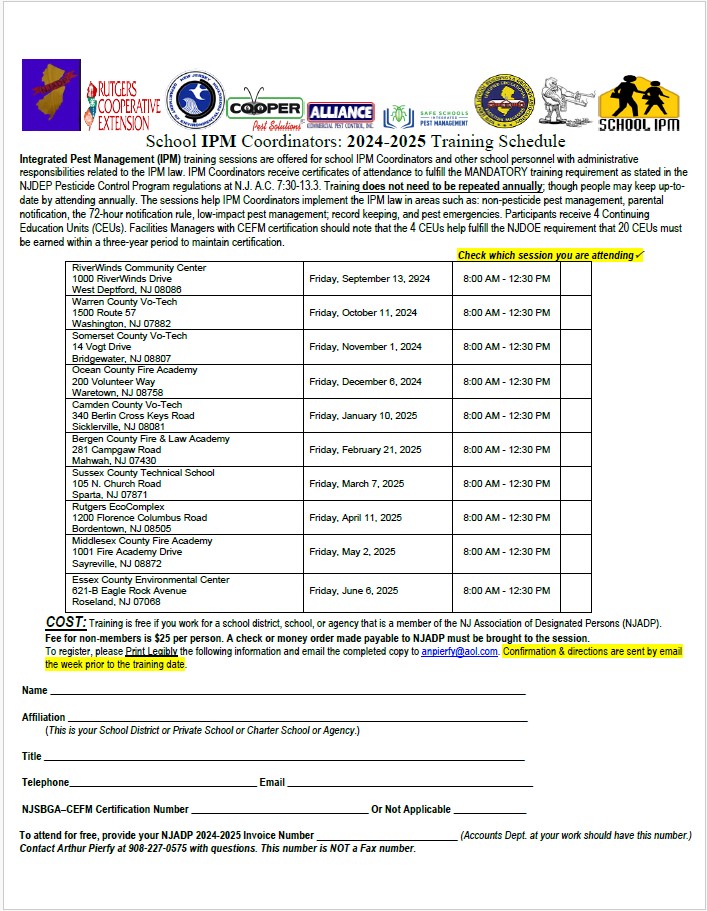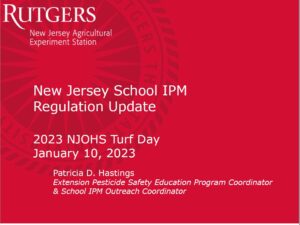Course: School IPM Coordinators: Making the Plan Work
The purpose of this training is to facilitate implementation of the requirements of New Jersey’s School IPM law by School IPM coordinators and other involved personnel. Attendance at this session by a School IPM Coordinator fulfills their training requirement per the regulations. Each attendee will receive a certificate of attendance. Pesticide credits for applicators will be issued as well.
This course is sponsored by the NJ Association of Designated Persons. Invited speakers include specialists from the New Jersey Department of Environmental Protection, Rutgers New Jersey Agricultural Experiment Station (NJAES) Cooperative Extension, and private firms.
Session Highlights:
Topics to be included are: notification requirements; the 72-hour notification rules; low-impact pesticides; record keeping; and dealing with pest emergencies.
Who Should Attend: School IPM Coordinators; School Superintendents; School Principals; Facility Directors; and Buildings and Grounds Officials.
Course Information: Download and complete the form IPM Registration 2024-2025 If you have any questions about the trainings, please contact Art Pierfy 908-227-0575 or email him at apierfy@icloud.com.
Fee: Training is free if you work for a school district, school, or agency that is a member of the NJ Association of Designated Persons (NJADP). Fee for non-members is $25 per person. A check or money order made payable to NJADP must be brought to the session.
Course Resource:
- Management of Natural Turf Sports Fields (9 pp.). NJAES Publication E3542. 8/19/2016.
Basic Landscape Integrated Pest Management (IPM) Course
Course Code: AL0434WA22
Rutgers NJAES Office of Continuing Professional Education
102 Ryders Lane; New Brunswick, NJ 08901-8591
Phone: (848) 932-9271
Integrated Pest Management (or IPM) is a commonsense approach that reduces reliance on chemical pest controls. Integrated Pest Management (or IPM) is a common sense approach to pest control that reduces reliance on chemical pesticides as a sole method of controlling pests. A combination of strategies is used to predict, prevent, and manage landscape insects and diseases. These IPM strategies are proactive, not reactions to the presence of a pest. IPM programs result in effective landscape pest control with diminished economic, health, and environmental risks.
This class covers both turf and ornamentals. Take Day One only to learn IPM philosophy, monitoring, and implementation strategies – or take the full three days for a comprehensive study featuring degree day models, improving soil health, insect and disease ID, creative ways of removing unwanted pests, and more!
Continuing Education Units (CEUs) and/or NJDEP Certified Pesticide Applicator recertification credits are available for qualified participants.
Pesticide Applicator Licensing and Recertification
NJDEP Pesticide Control Program
Pesticide Applicator Certification & Licensing Program
Phone: (609) 984-5014; fax: (609) 984-6555
Website: https://www.state.nj.us/dep/enforcement/pcp/
Courses for NEW Pesticide Applicator Licensing
In order to take the certification exams to become licensed to use pesticides in NJ, an applicator applicant must satisfy PCP-approved training requirements for basic pesticide safety and on-the-job training for any categories that they wish to be licensed. Pesticide training specifically must provide an understanding of the principles of Integrated Pest Management. For more details, go to the Pesticide Applicator Training section of this website.
New Jersey licensed commercial pesticide applicators are required to maintain their certification by attending courses awarding recertification credits in CORE and the categories in which they wish to maintain certification and licensing. Specifically, commercial applicators must complete a total of 8 CORE and 16 ‘category’ credits within five years beginning the first November following applicator certification. IPM concepts are covered with the category training; call the listed course moderator for details.
Recertification Course Schedules
The New Jersey Department of Environmental Protection (NJDEP) evaluates all recertification courses. Course topics offered for recertification credit include: Core (private or commercial certifications), PP2 for private certification, as well as each of the 13 commercial pest control categories. Recertification credits can be earned by either attending NJDEP-approved recertification courses, or by completing an NJDEP-approved online training module.
Numerous online CEU courses are available and the NJDEP reports that they continue to work directly with course providers to maintain an adequate number of online courses and CEUs while ensuring providers adhere to minimal online modality standards including student ID verification and class monitoring. For NJDEP’s list of available online CEU courses and providers, please click HERE.
Course: New Jersey Ornamental Horticulture Symposium
Topic: New Jersey School IPM Regulation Update
SLIDES:
